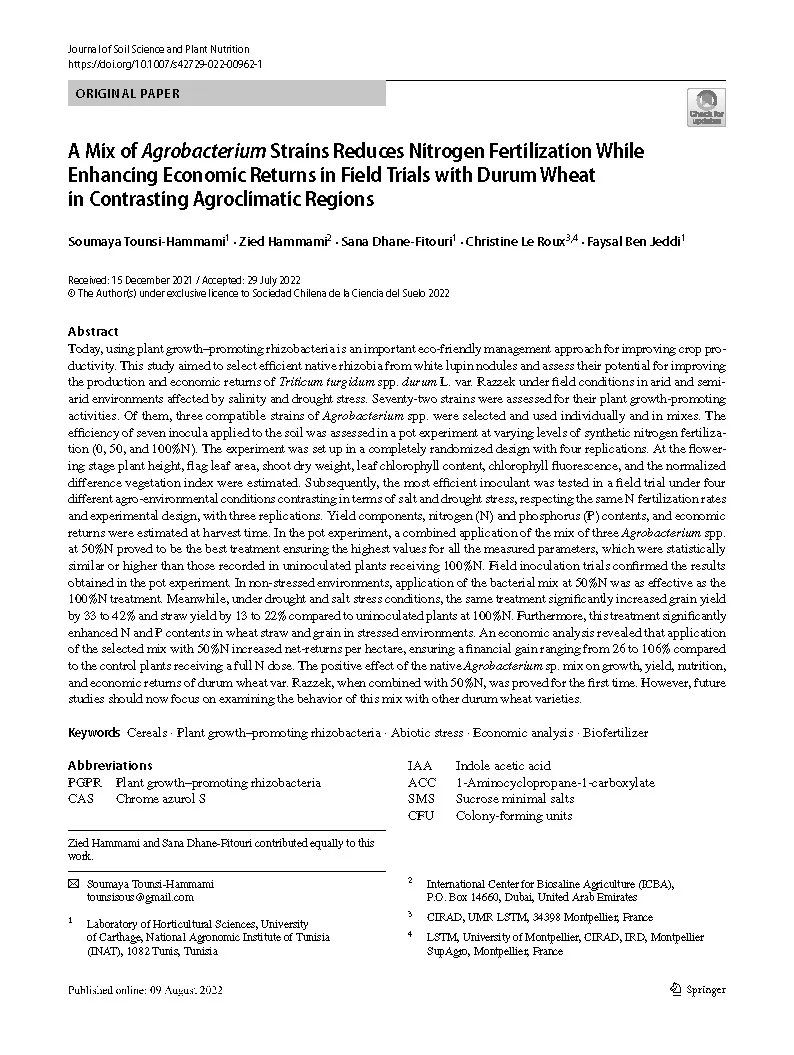A Mix of Agrobacterium Strains Reduces Nitrogen Fertilization While Enhancing Economic Returns in Field Trials with Durum Wheat in Contrasting Agroclimatic Regions
Today, using plant growth–promoting rhizobacteria is an important eco-friendly management approach for improving crop productivity. This study aimed to select efficient native rhizobia from white lupin nodules and assess their potential for improving the production and economic returns of Triticum turgidum spp. durum L. var. Razzek under field conditions in arid and semi-arid environments affected by salinity and drought stress. Seventy-two strains were assessed for their plant growth-promoting activities. Of them, three compatible strains of Agrobacterium spp. were selected and used individually and in mixes. The efficiency of seven inocula applied to the soil was assessed in a pot experiment at varying levels of synthetic nitrogen fertilization (0, 50, and 100%N). The experiment was set up in a completely randomized design with four replications. At the flowering stage plant height, flag leaf area, shoot dry weight, leaf chlorophyll content, chlorophyll fluorescence, and the normalized difference vegetation index were estimated. Subsequently, the most efficient inoculant was tested in a field trial under four different agro-environmental conditions contrasting in terms of salt and drought stress, respecting the same N fertilization rates and experimental design, with three replications. Yield components, nitrogen (N) and phosphorus (P) contents, and economic returns were estimated at harvest time. In the pot experiment, a combined application of the mix of three Agrobacterium spp. at 50%N proved to be the best treatment ensuring the highest values for all the measured parameters, which were statistically similar or higher than those recorded in uninoculated plants receiving 100%N. Field inoculation trials confirmed the results obtained in the pot experiment. In non-stressed environments, application of the bacterial mix at 50%N was as effective as the 100%N treatment. Meanwhile, under drought and salt stress conditions, the same treatment significantly increased grain yield by 33 to 42% and straw yield by 13 to 22% compared to uninoculated plants at 100%N. Furthermore, this treatment significantly enhanced N and P contents in wheat straw and grain in stressed environments. An economic analysis revealed that application of the selected mix with 50%N increased net-returns per hectare, ensuring a financial gain ranging from 26 to 106% compared to the control plants receiving a full N dose. The positive effect of the native Agrobacterium sp. mix on growth, yield, nutrition, and economic returns of durum wheat var. Razzek, when combined with 50%N, was proved for the first time. However, future studies should now focus on examining the behavior of this mix with other durum wheat varieties.
Year
2022
Publication Source
Journal of Soil Science and Plant Nutrition
Publication type
Scientific Paper











